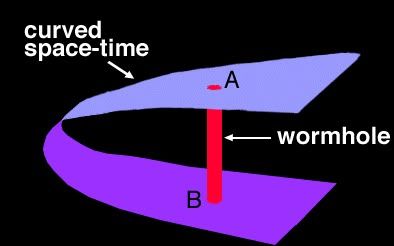This phenomenon is due to the principal of time dilation, which states that bodies moving at high velocities experience a time that ticks slower than the time measured at zero velocity.3 Not as much time elapses for a moving body as does for everything else. Phenomena known as wormholes and closed timelike curves are possible means of time travel into the future and the past.4 Traveling into the past is a task which is much more difficult than traveling into the future.
This feat has not yet been accomplished -to our knowledge- and its theory involves complicated scenarios of tears in four dimensional space-time, and traveling near the speed of light. Obstacles which prevent our hubris attempts to cheat time include our inability to move even close to the speed of light, and finding a source of energy as powerful as an exploding star. Simply because the proposal of time travel is backed by scientific theory, is no reason to expect that it is easily achievable. Numerous arguments are proposed that that prevent time travel into the past. Both common sense and scientific fact can be used to paint scenarios that become serious obstacles. Not to fear, we have all the time in the world to overcome these minor limitations.
Imagine if you will, that you are one of the people sill alive today that was born prior to 1903, when the first airplane took flight. When you were young the idea of flying would probably have been quite exciting. Some scientists believe that we may presently be living through an identical scenario. The thing that would be so exciting however, would not be flight, but time travel.
Leading scientists believe that our children will live to once again see the impossible become routine. Professor Michio Kaku of the University of New York believes that space flight may one day unlock the secret of time itself. This will require the development of spacecraft that can travel at speeds on the order of two hundred million meters per second, that’s about four hundred and fifty million miles per hour. Craft traveling at this speed will take us near the speed of light, where time actually slows down. This is what’s known as time dilation. Einstein’s theories predict that the faster a spacecraft moves, the slower time ticks inside of it. Imagine that a rocket ship takes off from earth and approaches the speed of light. If we were to watch it from earth with a very powerful telescope as it traveled away from us, we would see everyone inside the ship as being frozen in time. To us their time would slow down, but to them nothing would change! This has been measured in the laboratory and on location using atomic clocks, aircraft, satellites and rockets.
It is proven that time slows down the faster you move.
In 1975 Professor Carol Allie of the University of Maryland tested Einstein’s theory using two synchronized atomic clocks. One clock was loaded on a plane and flown for several hours, while the other clock remained on the ground at the air base. Upon return, the clock on board the plane was found to be ever so slightly slower that the one on the ground. This was not due to experimental error, and has been repeated numerous times with the same result. This difference in time is even more pronounced in satellites such as the space station. This is because these objects are traveling at speeds much faster and for much longer periods than possible in an airplane. The faster an object moves, the more time is distorted.
Now that we know that it is possible to travel into the future by moving at great speeds, the next problem is how to travel in time a respectable amount without having to sit in a fast moving spaceship for years. This problem is solved by the theoretical existence of what are know as closed timelike curves, and wormholes.
Einstein’s special and general theories of relativity combine three-dimensional space with time to form four dimensional space-time.2 Space-time consists of points or events that represent a particular place at a particular time. Your entire life thus forms a sort of twisting, turning worm in space time! The tip of the worm’s tail would be your birth and its head is the event of your death. The line which this worm creates with its body is called that object’s worldline. Einstein predicts that worldlines can be distorted by massive bodies such as black holes. This is essentially the origin of gravity, remember. Now if an object’s worldline were to be distorted so much as to form a loop that connected with a point on itself that represented an earlier place and time, it would create a corridor to the past! Picture a loop to loop track that smashes into itself as it comes back around. This closed loop is called a closed timelike curve.
Timelike means that the body under consideration experiences time that increases in one direction along its worldline.Princeton University physicist John A. Wheeler, and Kip S. Thorne of Cal. Tech. have shown that a closed timelike curve is one way to create a kind of shortcut through space-time called a wormhole.

Wormholes are holes in the fabric of four dimensional space-time, that are connected, but which originate at different points in space and at different times. They provide a quick path between two different locations in space and time. This is the four dimensional equivalent of pinching two pieces of a folded sheet of paper together to make contact across the gap. Distortions in space cause the points separated by the gap to bulge out and connect. This forms a wormhole through which something could instantaneously travel to a far away place and time.4 No more problems of traveling in a rocket ship for years to get into the future! This is essentially what was written about in "Alice in Wonderland’s Through the Looking Glass." Her looking glass was a wormhole that connected her home in Oxford, with wonderland.

All she had to do was climb into her looking glass and she would emerge on the other side of forever. In reality however, it would require a much more elaborate scheme to create a wormhole that connects two different points in space-time. First it would require the construction of two identical machines consisting of two huge parallel metal plates that are electrically charged with unbelievable amounts of energy. When the machines are placed in proximity of each other, the enormous amounts of energy -about that of an exploding star- would rip a hole in space-time and connect the two machines via a wormhole. This is possible, and the beginnings of it have been illustrated in the lab by what is known as the Casimir Effect. The next task would be to place one of these machines on a craft that could travel at close to the speed of light. The craft would take one machine on a journey while it was still connected to the one on earth via the wormhole. Now, a simple step into the wormhole would transport you to a different place and a different time.
Wormholes and closed timelike loops appear to be the main ways that time travel into the past would be possible. The limitation on this time travel into the past is that it would be impossible to travel back to a time before the machine was originally created. Although the aforementioned theories of general relativity are consistent for closed timelike curves and wormholes, the theories say nothing about the actual process of traveling through them. Quantum mechanics can be used to model possible scenarios, and yields the probability of each possible output. Quantum mechanics, when used in the context of time travel, has a so-called many-universe interpretation. This was first proposed by Hugh Everett III in 1957.3 It encompasses the idea that if something can physically happen, it does in some universe. Everett says that our reality is only one of many equally valid universes. There is a collection of universes, called a multiverse. Every multiverse has copies of every person, structure, and atom. For every possible event, every possible outcome is said to be played out on a different universe. This interpretation of quantum mechanics is quite controversial however, but does elicit the notion that it may be impossible to travel backward in time to our own universe or dimension. One must consider what past would be the destination of a time traveler.
The notion that time travel could link parallel universes, has been anticipated in science fiction novels, and is even depicted in the popular television series "Sliders." In this program, a "sliding machine" creates a wormhole that links two parallel dimensions. Each week the group of "sliders" jump into the wormhole and emerge in the same place and time, but a different dimension. They can run into their other selves and experience a reality that has yielded a vastly different society than their own. The interesting thing is that the stuff of science fiction, can be deduced from existing physical theory. All the claims made about time travel are consequences of basic scientific laws and standard quantum mechanics.
The proposal of time travel is backed by scientific theory, but that is not enough to make it realistically possible. Numerous arguments are proposed that that prevent time travel into the past. Both common sense and scientific fact construct serious obstacles. A major argument against time travel into the past is called the autonomy principle, better know as the grandfather paradox. This paradox is created when a time traveler goes back in time to meet his or her grandfather. Now upon their introduction it would be possible to change the course of events that lead up to your grandfather and grandmother marrying. You could tell him something about a family secret to convince him you are who you say you are, and he may proceed to tell his soon to be wife. She may in turn doubt his sanity and have him committed. Thus your grandparents would never have your mother, and therefore you couldn’t be born! But then how could you have ever existed to travel back in time if you don’t exist? You would have had to have been created via autonomy. The next question would be, if your mother was never born, then when you return to the future would anything you did in your life exist? Or would you, your friends, your home etc. never have existed? This is clearly an inconsistency paradox that would rule out time travel, yet interestingly enough the laws of physics do not forbid such excursions. The multiverse concept eradicates the problem of the autonomy principal, because it allows time travel to the past, but to a different universe. You would meet the person who was your grandfather in your universe, but never married your grandmother in his universe. In the universe that you traveled to, you never existed.
Another argument of impossibility is called the chronology principal. This principal states that time travelers could bring information to the past that could be used to create new ideas and products. This would involve no creative energy on the part of the "inventor." Imagine that Pablo Ruiz y Picasso, the most influential and successful artist of the 20th century, were to travel back in time to meet his younger self. Assuming he stays in his correct universe, he could give his younger self his portfolio containing copies of his paintings, sculptures, graphic art, and ceramics. The young version of Picasso could then meticulously copy the reproductions, profoundly and irrevocably affecting the future of art. Thus, the reproductions exist because they are copied from the originals, and the originals exist because they are copied from the reproductions. No creative energy would have ever been expended to create the masterpieces! 3 This chronology principal rules out travel into the past.
A notion that was once nothing more than science fiction, is now a concept that’s becoming reality. Einstein’s theories of general and special relativity can be used to actually prove that time travel is possible, and research has shown that fast moving craft can travel into the future. Time dilation is the easiest method because it merely requires high velocity motion to experience time travel.3 Phenomena known as wormholes and closed timelike curves are possible means of time travel into the future and the past.4 Traveling into the past is a task which is much more difficult however. Its theory involves complicated scenarios of tears in four dimensional space-time, energy equivalent to that of an exploding star, and traveling near the speed of light. Both common sense and scientific fact can be used to paint scenarios that become serious obstacles. Yet even these hindrances can be explained away! If the multiverse concept is reality, then most present ideas of time travel are based on a false reality. If time travel is completely impossible then the reason has yet to be discovered
References
1) Bagnall, Phil , "Where have all the time travelers gone?" New Scientist July 6 1996, v151
2) Deutsch, David, & Lockwood, Michael , "The quantum physics of time travel," Scientific American March 1994, v270
3) Parsons, Paul , "A warped view of time travel," Science October 11 1996, v274
4) "How to murder your grandfather and still get born," The Economist January 20 1996, v338
Source:http://brianbosak.com*
a brian creation - created 8/10/97, updated 3/16/01
*This site was used by the TV show "NOVA" on PBS CH11 Chicago


















